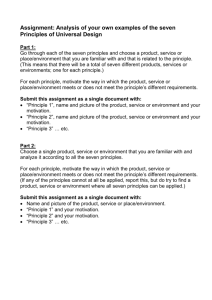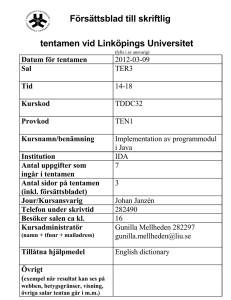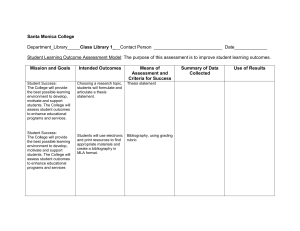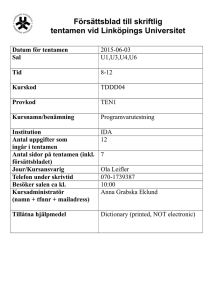Försättsblad till skriftlig tentamen vid Linköpings universitet
advertisement
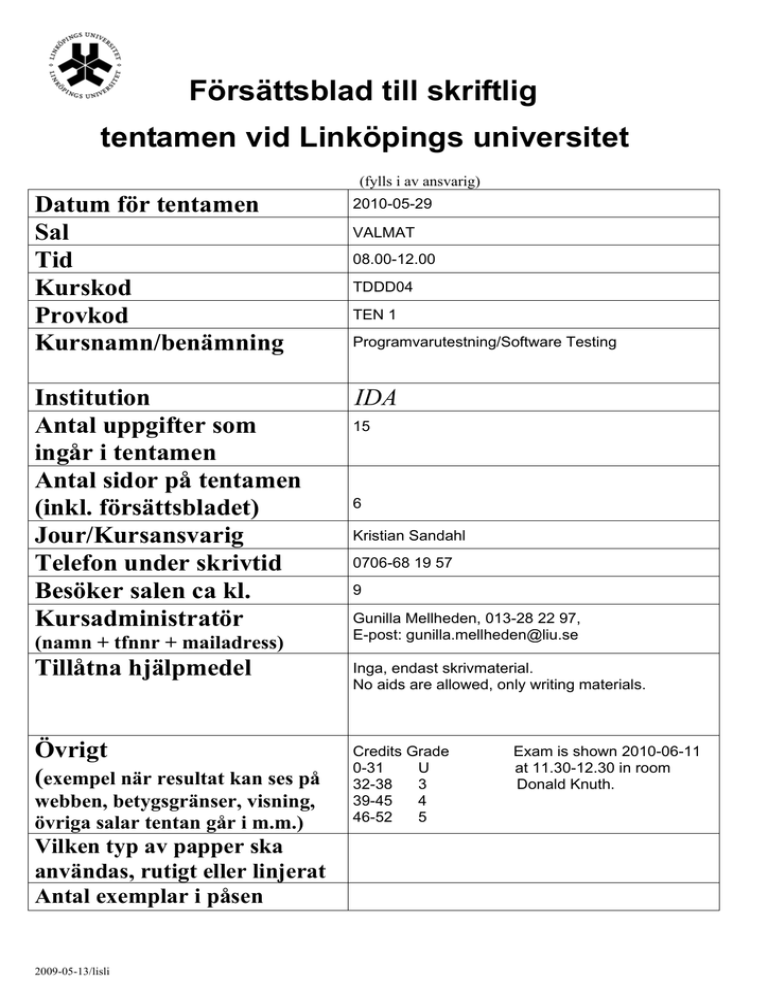
Försättsblad till skriftlig tentamen vid Linköpings universitet (fylls i av ansvarig) Datum för tentamen Sal Tid Kurskod Provkod Kursnamn/benämning 2010-05-29 Institution Antal uppgifter som ingår i tentamen Antal sidor på tentamen (inkl. försättsbladet) Jour/Kursansvarig Telefon under skrivtid Besöker salen ca kl. Kursadministratör IDA (namn + tfnnr + mailadress) VALMAT 08.00-12.00 TDDD04 TEN 1 Programvarutestning/Software Testing 15 6 Kristian Sandahl 0706-68 19 57 9 Gunilla Mellheden, 013-28 22 97, E-post: gunilla.mellheden@liu.se Tillåtna hjälpmedel Inga, endast skrivmaterial. No aids are allowed, only writing materials. Övrigt (exempel när resultat kan ses på Credits Grade 0-31 U 32-38 3 39-45 4 46-52 5 webben, betygsgränser, visning, övriga salar tentan går i m.m.) Vilken typ av papper ska användas, rutigt eller linjerat Antal exemplar i påsen 2009-05-13/lisli Exam is shown 2010-06-11 at 11.30-12.30 in room Donald Knuth. Exam TDDD04 Software testing 2010-05-29 • • • Write clearly! Please use only one side of each paper and don’t address more than one question per page. Justify your answers! (I) Basic definitions 1. Describe/define the following terms: (3) a. Black-box testing b. White-box testing c. Oracle 2. Describe three parts of a well-designed test case. (3) (II) Unit and Integration testing 3. Pairwise testing (5) a. Which values must X and Y have in the table below to make it a L4(23) orthogonal array? Don’t forget to motivate the answer. 1 2 3 4 1 1 1 2 2 2 1 2 1 2 3 1 2 X Y b. Suppose you have a web-based system which supports the following environments: • Browser: Internet Explorer, Mozilla • Client operating system: Windows7, Windows Vista • Server operating system: Windows, Linux A system configuration is defined as a set of the three variables, Browser, Client operating system and Server operating system, with valid values. For this system, make a table of inputs of test cases for pairwise testing of the possible configurations with a minimum number of test cases. c. How many test cases would be needed for exhaustive testing of the configurations? Don’t forget to motivate your answer. 1 4. Assume you have a system that accepts five to nine inputs which are integers between 100 and 1000. Which inputs do you select if you want to accomplish boundary value testing? Motivate your choice. (2) 5. Integration testing. (6) The following figure illustrates the component hierarchy in a software system. A B F D C G H E J I K L a. Describe the sequence of tests for integration of the components using a bottom-up approach and a top-down approach. b. How many stubs are needed for top-down integration? Don’t forget to explain how you calculated the result, since there are different conventions of how to calculate this. c. How many drivers are needed for bottom-up integration? Motivate clearly. 6. Unit testing (4) xUnit is a term used to describe a certain type of testing tools a. b. c. d. What does a xUnit tool do? Name an example of a xUnit tool. How are tests represented in xUnit? Which are the basic functions that xUnit will support you with while executing tests? 7. What is the difference between stubs and mocks? (2) 2 8. Data-flow dependencies (5) Below you find the control flow graph of the billing application in Badlaney et al (2006). For the variables Usage and Bill, write down the define-use-kill patterns. Can you find any problems of the control flow graph in the patterns? 9. Path coverage (4) Consider the control graph for calculating a humoristic Youthfactor on the next page. a. b. c. d. Calculate the cyclomatic complexity of the control graph Write down input values for test cases that satisfy McCabe’s base path coverage. Write down an additional test case you have to add to achieve full path coverage. Write down a definition of full path coverage. 3 (III) System testing 10. Cause-effect testing (4) Specification: the character in column 1 must be an “A” or a “B”. The character in column 2 must be a digit. In this situation, the file update is made. If the first character is incorrect, message XNC is issued. If the first character is correct, but the second character is not a digit, message XND is issued. Based on the specification above: a. Identify causes and effects. b. Design a cause-effect graph for the identified causes and effects. c. Propose a decision table for testing the software. 4 11. Function test Describe the following concepts: (3) a. Atomic System Function (ASF) b. Source ASF c. Sink ASF 12. What is Benchmark testing? Give an example in which Benchmark testing can be used. (2) (IV) Automated testing 13. Model-based testing (5) a. Describe a Model-based testing process with at least 3 artifacts and 3 activities. b. Describe 2 steps in the process that might be possible to automate. Don’t forget to motivate your answer. 14. Write down a short description of the data-driven scripting techniques. Give one advantage and one potential drawback data-driven scripting techniques. (3) 15. If you are committed to the IEEE-Std 829-2008, and have bought at good bug-tracking system, do you need to maintain both the text-based document and the information in the tool? Don’t forget to motivate your answer (1) 5
